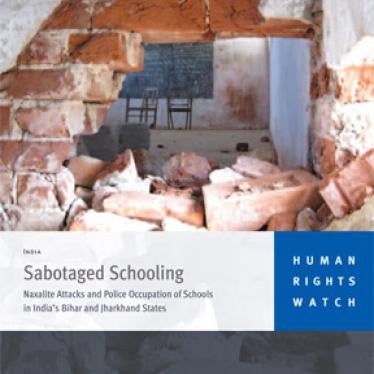(New York) - The Indian government should not equate peaceful political speech with criminal acts while conducting its operations against armed Maoist groups, Human Rights Watch said today.
The Indian government appears to have threatened to curb the right to freedom of expression by treating it as equivalent to providing material or physical support for criminal acts by the proscribed Communist Party of India (Maoist), also known as Naxalites, which the government has banned.
"The Indian government should think twice before trying to silence political discussion and demanding endorsement of its views on Maoist groups," said Brad Adams, Asia director at Human Rights Watch. "The recent views expressed by the Indian government against so-called sympathizers could be understood as carte blanche by local authorities to harass and arrest critics of Indian government policy."
On May 6, 2010, the Home Ministry issued a statement saying that, "It has come to the notice of the government that some Maoist leaders have been directly contacting certain NGOs and intellectuals to propagate their ideology and persuade them to take steps which would provide support to the CPI (Maoist) ideology." Government officials warned members of civil society that the Unlawful Activities (Prevention) Act, 1967, which calls for imprisonment of up to 10 years, could be used to punish individuals in contact with the Maoists. Home Minister P. Chidambaram had earlier called upon civil society demanding "voices of condemnation of those who have, erroneously, extended intellectual and material support to the CPI (Maoist)."
The Maoists claim to speak for the rights of the marginalized, including landless peasants, tribal groups, and Dalits. Maoists have been responsible for serious abuses, including the destruction of schools and hospitals, extortion, torture, and killings. The Indian government has acknowledged that the failure of the government to provide adequate services and development opportunities has led to disaffection and support for the Maoists in some areas.
The Indian government has carried out armed operations to restore law and order in areas dominated by the Maoists and to protect the population. Some state governments combating the Maoists, particularly in Chhattisgarh, have long subjected human rights defenders and activists to surveillance, arbitrary travel restrictions, filing of false cases, arbitrary arrests, and slander campaigns in the press. Journalists often practice self-censorship to protect themselves from government harassment. Arbitrary arrests, torture, and extrajudicial killings by government forces create a risk of fueling anger and recruiting people to the Maoist cause, Human Rights Watch said.
The population in affected areas is often caught between the Maoist combatants and government security forces. The Maoists frequently demand food or shelter at gunpoint and engage in forcible recruitment. Government forces often arrest and abuse those same villagers, claiming that they are Maoist supporters.
"The Indian government is well aware that security operations often result in increased rights abuses," Adams said. "An active and fearless civil society that monitors abuses by both sides is crucial to ensure the protection of civilians. Threats to civil society have no place in a democracy."







